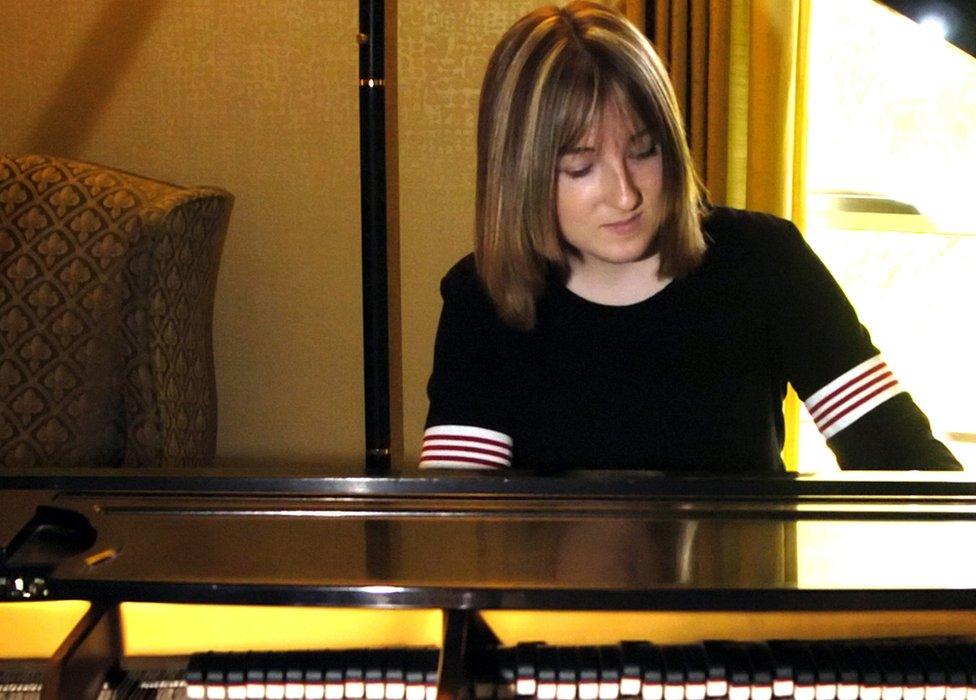Should you go online with allegations of domestic violence?
- Published

Hillary Adams' family was thrust into the spotlight when she posted a video of her father beating her with a belt. Three years later, she says she has no regrets
A shocking video by a woman with a black eye went viral this week - but is taking to social media with abuse allegations always the right thing to do?
This week millions of Facebook users watched an emotional video by a 26-year-old mother of two from Dublin. Emma Murphy spoke out about alleged abuse at the hands of her partner - who's now under investigation by Irish police, external - and urged victims to seek help.
"If anyone out there has gone through something similar," Murphy says in the video, "go to your friends and family and the people who care for you, and go talk to them."
But is it a good idea to take to social media to highlight domestic violence?
One woman whose story of abuse at the hands of her father went viral in 2011, external told BBC Trending that she immediately had second thoughts after posting a video of her father beating her with a belt. But upon reflection, Hillary Adams thinks posting the graphic eight-minute video - which has since been watched more than 7 million times - was the right thing to do.
Adams' father, William Adams, was an elected county judge in Texas, and denied wrongdoing, claiming he was just disciplining his daughter, external. Prosecutors determined that too much time had passed to press charges - the video was actually shot seven years before Hillary Adams posted it to YouTube. But as a result of the controversy, William Adams was suspended from his job, external, which involved hearing family court cases, and later lost a re-election bid, external.
Hillary Adams now says she was surprised by the initial reaction to the footage.
"I didn't know it would get so huge," she says. "And it got out of hand within about two and a half hours."
"[Strangers] were calling his house, they were calling his family members' houses, since they had the same last name," she recalls.
Hillary seemed to have second thoughts at the time and tweeted: "It is my wish that people stop threatening my father and start offering professional help. That is what he really needs". But she now says those sentiments were wrong, and she has no regrets about posting the footage.
"Anything I said in interviews back then about wanting to protect him, or about how I didn't want him to lose his job, that was me still being under the impression he was still a normal person," she says. "I thought he just needed help. Today I think very differently about him and I would be OK if I never talked to him again."
She does feel differently, however, about the impact of the video on her mother, who is seen on camera encouraging William Adams and at one point beating Hillary herself.
"It isn't fair to make judgements on my mother," she says. "When people saw her with that belt in her hand, she was trying to fix things the only way she knew how to.
"People don't know the environment you're in, when you're a trapped animal and you have to make decisions to turn against your own kids. People sent her death threats. It was horrible. I'm pretty sure she lost more than one job because people saw the video and didn't care to do more research.
"That I really wish I had some way to change," she admits.

BBC Trending Radio
Hear more about this story on the BBC World Service - you can stream our radio programme or download our podcast.

Hillary Adams has had years to reflect on the long-term impact of posting her video, but there are of course more immediate concerns for domestic violence victims. Ruth Glenn, of the US National Coalition Against Domestic Violence says the impact of such videos can be decidedly mixed.
"The pros are that victims are finding a way to be out front with what's happening to them. They're gaining their voice," she says. "But the cons are, first and foremost, a victim's safety."
Glenn says that an abuser, realising that they are no longer in control of the situation, might lash out at a victim - and that that possibility is much more likely than the abuser realising they are wrong and seeking help.
"Victims also have to assess, are they prepared for the consequences of posting such information online. They will mostly receive positive comments… but they have to be prepared for the negative feedback that inevitably will come."
Emma Murphy, the Irish woman whose video went viral this week, did receive thousands of comments on her Facebook page. The vast majority were positive but there were a few which were critical. And there was also some discussion about the merits of posting such footage on social media.
For her part, Murphy told Irish radio station 98FM, external that the video has allowed her to move on in life.
"The main reason for posting the video was that previous to that, I would have chased him," she said. "I would have always gone after him and said, 'let's work it out'… I knew by posting that video that that this was it, that I would have the strength to walk away because I knew that there was no going back now."
Reporting by Estelle Doyle and Anne-Marie Tomchak
Blog by Mike Wendling, external
Next story: Why do thousands want to show off Mecca on a chat app?

Almost 300,000 people tweeted #Mecca_live, external as part of a campaign to get Snapchat to feature the Saudi city - which is closed to non-Muslim visitors - on their app. READ MORE
You can follow BBC Trending on Twitter @BBCtrending, external, and find us on Facebook, external. All our stories are at bbc.com/trending.